The Electoral Repository
African Region's Human Rights and Inclusion Instruments
Constitutions are fundamental documents that outline the structure of government, define powers and rights, and ensure the rule of law. They serve as the supreme law of the land, guiding governance and legal systems.
Human Rights and Inclusion Instruments
Human Rights & Inclusion Instruments in North Africa
Northern African constitutions embody diverse histories and aspirations, from Tunisia’s progressive reforms to Sudan’s ongoing revisions post-upheaval. Despite challenges, they signify a collective pursuit of democracy and human rights in the region.
Human Rights & Inclusion Instruments in West Africa
The West African region consists of 16 countries, each governed by its own constitution. These constitutions outline the structure of government, including the roles of the president, parliament, and judiciary, tailored to the specific contexts of each country.
Human Rights & Inclusion Instruments in Central Africa
The Central African region consists of 9 countries, each with its own constitution. These constitutions outline the governance structure of each country, including the roles of the president, parliament, and judiciary, tailored to their specific historical and political contexts.
Human Rights & Inclusion Instruments in East Africa
East African constitutions, spanning countries like Kenya and Tanzania, shape governance and rights in diverse ways, reflecting the region’s quest for stability and development.
Human Rights & Inclusion Instruments in Sourthen Africa
Constitutions and Laws
The Southern African region includes 5 countries, each governed by its own constitution. These constitutions outline the structure of government, including the roles of the president, parliament, and judiciary, tailored to each country’s unique historical and political contexts.
